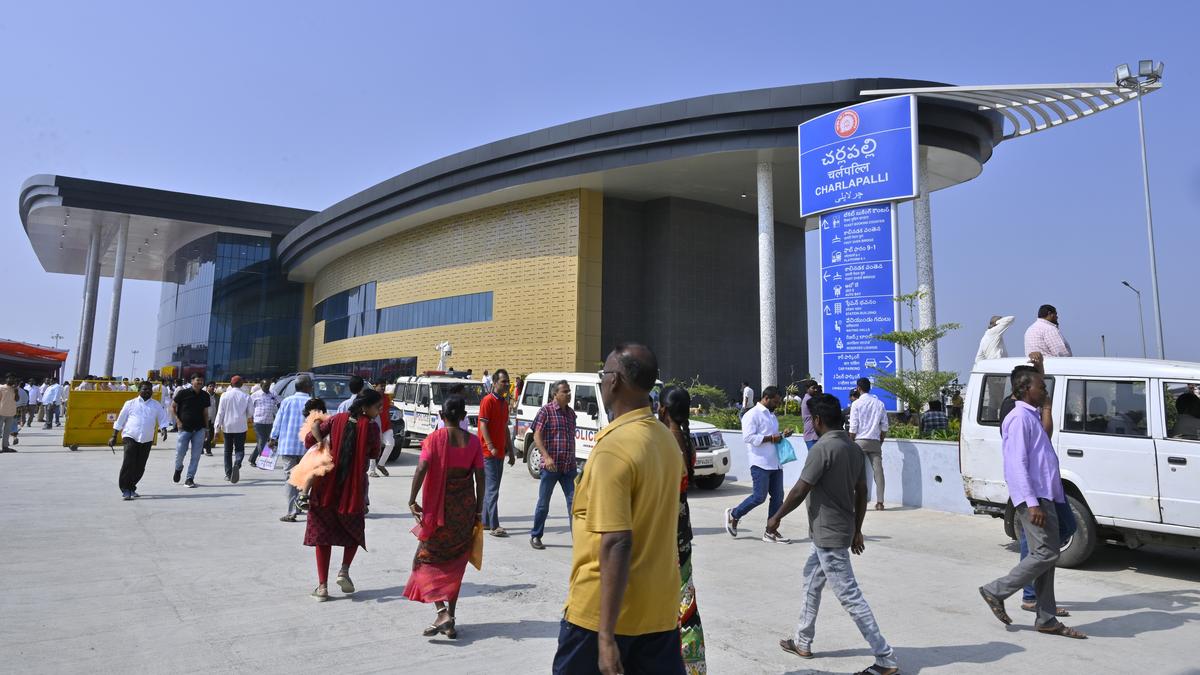 |
|
The inauguration of the ₹413 crore Cherlapalli Railway Terminal in Hyderabad on January 6, 2025, highlighted a significant point of contention between the central and Telangana governments: the construction of the approach road to the newly built station. This seemingly simple infrastructure project quickly escalated into a public debate, revealing deeper political undercurrents and underscoring the complexities of inter-governmental cooperation in India. The disagreement centers on the responsibility for funding and executing the approach road project, with the central government firmly placing the onus on the state government, while the Telangana government appeals for central funding and collaboration.
Telangana's Minister for IT and Industries, D. Sridhar Babu, directly addressed the central government during the inaugural ceremony, requesting financial assistance for the approach road development. He proposed a model similar to integrated airport approaches, emphasizing the importance of easing commuter travel and improving the overall infrastructure around the station. He also highlighted the need for support in completing pending railway works. This request highlights the state government's perspective, emphasizing the broader economic and social benefits of a well-connected railway station and its surrounding area. The request is not simply for a road but for a complete integrated infrastructure development.
In contrast, Union Minister of State for Railways and Jal Shakti, V. Somanna, unequivocally stated that the construction of approach roads falls under the purview of the state government. He emphasized that the central government has already invested substantial funds—thousands of crores of rupees—in the development of the railway station itself. His assertion underscores the central government's position, highlighting their significant investment in the railway infrastructure and emphasizing their perceived responsibility to focus on core railway-related projects while maintaining that approach roads are a state-level responsibility.
Further complicating the matter, Union Minister of Coal and Mines G. Kishan Reddy, also the Secunderabad MP, appealed to the state government to take on the approach road construction, emphasizing the need for a collaborative spirit. He brought up the substantial amount the state government allegedly owes for the MMTS phase-II project, implying a lack of financial commitment on the part of the state. This further highlights the strained relationship between the state and central government, adding another layer to the ongoing dispute regarding project funding and execution.
The involvement of Chief Minister A. Revanth Reddy in holding a coordination meeting to review the approach road work contrasts sharply with the approach of his predecessor, K. Chandrasekhar Rao, who allegedly did not respond to previous communication. This contrast underlines the change in political leadership and the potential shift in approach towards inter-governmental relations. The mention of the previous Chief Minister's lack of response suggests a deeper political history associated with the project and potentially influences the current dynamic.
Union Minister of State for Home Bandi Sanjay Kumar called for both the center and state to set aside political differences and collaborate for the betterment of the people. His statement underscores the broader context of the conflict, highlighting the potential for political maneuvering to overshadow the pressing need for infrastructure development. The emphasis on cooperation emphasizes the need to prioritize public welfare over political gain.
The diverse perspectives expressed during the inaugural ceremony highlight the complexities of inter-governmental relations in India. The disagreement over the approach road is not merely a localized infrastructure issue; it reflects deeper political dynamics, resource allocation disputes, and the ongoing tension between central and state governments in executing and funding development projects. The lack of a clear resolution at the inauguration underscores the potential for this issue to continue to be a point of contention in the coming months and years. The ongoing debate reveals a deeper struggle over authority and resources, with both sides having strong justifications, even if somewhat politically charged.
The contrasting viewpoints of the involved ministers demonstrate the lack of unified vision regarding infrastructure development in India. While the central government boasts of its substantial investment in national infrastructure projects, the state government advocates for collaborative funding models for projects that benefit both the central and state level. This discrepancy underscores the need for a clearer framework of intergovernmental collaboration in infrastructural planning and funding. The lack of such a unified framework has clearly caused friction, highlighting the gaps in inter-governmental communication and coordination.
The case of Cherlapalli station's approach road serves as a microcosm of larger challenges facing India's infrastructure development. The ongoing debate underscores the need for more efficient mechanisms for intergovernmental cooperation, improved communication channels, and clearer delineations of responsibilities to avoid future conflicts and delays in critical projects. Without a resolution, similar conflicts are likely to arise in other infrastructure projects, hindering overall development progress. The lack of immediate resolution points towards systemic issues impacting inter-governmental cooperation, especially on matters of infrastructure development.
Ultimately, the resolution of this dispute will have broader implications for future infrastructure projects in Telangana and potentially other states. The approach taken—whether through compromise, arbitration, or continued stalemate—will set a precedent for similar future cases, influencing the future dynamics of state-central government relations in infrastructure development. The outcome of this dispute will have far-reaching effects, not just on the Cherlapalli station, but on the overall infrastructure development landscape of Telangana and potentially India.
Source: Who will build proper approach road to Hyderabad’s Cherlapalli station?
